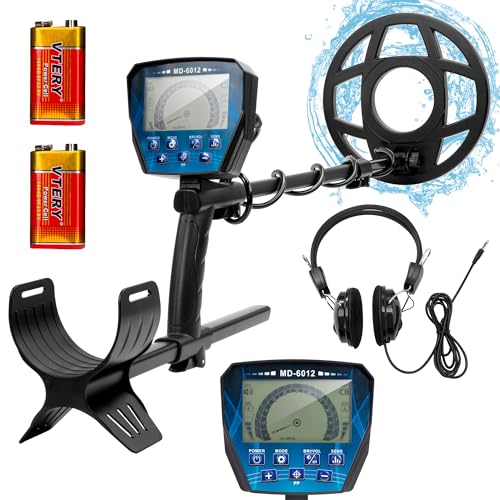
Going out with a trusty metal detector is a fun way to spend an afternoon, and while many people use one of these devices to look for specific metals, e.g., gold nuggets or coins, others aren’t picky about what they find and simply enjoy finding something new every time they go out.
But if you’ve ever wondered what metals do metal detectors detect, you might be surprised at the answer because metal detectors can find more than just broken jewelry and rusty treasures.
They can, in fact, find items that are worth a lot of money, but you have to learn a few tips first in order to be successful in this endeavor.
What Metals do Metal Detectors Detect -First Things First
Before you learn about what metals do metal detectors detect, it’s best if you learn a bit about metal detectors first. Do you have to spend a lot of money in order to get a metal detector that can find tons of valuables under the earth?
Not necessarily, but you don’t want to buy the cheapest metal detector, either. To begin with, there are three main types of metal detectors, and they are as follows:
● Best frequency oscillation (BFO) metal detectors. These metal detectors automatically send out signals that are interrupted whenever a metal object is detected. Because of this interruption, you know immediately when any type of metal is found underneath the ground. Morse code is used to make the signals easy to transmit and easy to understand.
● Pulse induction (PI) metal detectors. These are super-fancy metal detectors made mostly for industrial and commercial use. Because of this, they are usually very expensive. They are also seldom, if ever, used by the casual metal-detecting enthusiast.
● Very low frequency (VLF) metal detectors. The biggest advantage of these detectors is that they can be tuned to look for a particular type of metal if that’s what you want. In other words, if all you’re interested in is finding pieces of silver, you can tune it to detect silver only and it will ignore all other types of metal in the ground.

Another factor to consider is how deep in the ground the detector is able to detect metals. Some of these metals are found very deep in the ground; in fact, some of the best treasures are often found very deep under the ground.
Don’t worry, though, because a high-quality metal detector will be able to find a lot of metal regardless of where they are located, and this includes both ferrous and non-ferrous metals.
Ferrous Versus Non-Ferrous Metals
When you are considering what metals metal detectors detect, you need to understand that these metals can be ferrous or non-ferrous. Ferrous metals contain iron and steel and are easily attracted to a magnet. They are also easy to find with a metal detector.
By contrast, non-ferrous metals are non-magnetic and contain no iron. They are still relatively easy to find with a metal detector but have no conductive properties as ferrous metals do. Most metal detector enthusiasts are in search of non-ferrous metals and most metal detectors can detect the following metals:
Aluminum
More often than not, aluminum items that pop up when you’re using a metal detector include aluminum cans and aluminum foil, but occasionally people will find old aluminum tokens that were used from the late 1800s to the early 20th century.
These trade tokens were once very popular, and some of them are even very valuable. If you find one of these aluminum tokens, you might want to take it to a pawn shop or antique shop and find out whether it’s valuable or just junk.
Even if they end up being junk, you can recycle the tokens as well as the foil and soda cans, and do something good for the environment. You might even be able to make a little money if you take them to places that pay people for aluminum items.
Brass/Bronze/Copper
Brass and bronze are alloys of copper, with the latter being one of the oldest metals known to man. Because millions of products have been made out of these three metals, it is very possible that you could find a treasure made out of the same. Some copper, brass, and bronze possibilities include the following:
● Copper coins such as Indian heads, large cent pennies, and wheat cents
● Musical instruments made out of bronze or brass
● Pots, utensils, and storage containers made out of copper
● Tokens, medallions, or coins made out of brass or bronze
If you end up with some coins, never automatically assume that they are worthless, and don’t be embarrassed about bringing them to a coin dealer to assess their value.
While most coins end up being worth very little, people hit the jackpot all the time; therefore, you have nothing to lose by getting your coins assessed by a professional.
Gold
What Metals Do Metal Detectors Detect? Well, gold for one. Gold nuggets and pieces pop up all the time when people are using their metal detectors, and since the price of gold is usually quite high, you might be surprised by how much even a small chunk of gold is worth.
While many people never get lucky enough to find gold when they’re out with their metal detector, many others have much better luck and find items such as jewelry, coins, and statues, among others.
Even broken pieces are worth something since gold and coin dealers usually pay you for these items by the ounce.

It is recommended that you do two things if you’re specifically searching for gold with your metal detector.
First, spend the money on a good pinpointer to make the task easier; second, make sure that you purchase a high-frequency type of metal detector.
Both of these tips will greatly increase the odds of finding gold pieces and nuggets on your next metal-detecting adventure.
Lead
If you’re looking for lead items specifically, you should use a high-frequency detector for smaller items and a low-frequency detector for larger lead items.
If you take your metal detector to a location that is known to be the site of a battle of long ago, you have a good chance of finding some very interesting items. These include:
● Bullets from the Civil War
● Flintlocks that came from muskets
● Items such as utensils, cups, plates, and other kitchenware
● Musket balls from the Revolutionary War
Not that long ago, lead was difficult to detect with most metal detectors, but that is no longer the case. It shouldn’t be difficult for you to find old lead items when you take your metal detector out for an outing.
Nickel
While not great at conducting electricity, nickel is still easily found with most metal detectors. Coins and meteorites are the two most common items made out of nickel detected by a metal detector.
Some of the nickel coins you find can be very valuable, including buffalo nickels, Liberty nickels, and proof shield coins, among others. Meteorites can be found almost anywhere and if you find one that is really large, it can be very valuable.
This is evidenced by the fact that there are tons of people out there with metal detectors who are looking just for meteorites and nothing else. They come in all sizes and shapes, but the bigger they are, the more valuable they are.
Silver
While most people are thrilled when they find silver coins with their metal detector, there are a lot of other silver items you can find that can be just as valuable. They include:
● Buttons
● Jewelry
● Medallions
● Pots, utensils, pans, and other kitchenware
● Spoons (especially the commemorative spoons)
● Tokens
While silver is not usually as valuable as gold, it is still valuable overall, and as with gold, you don’t have to find huge pieces of silver to make some money with your find.
Even smaller or broken pieces can help you earn some good money, so it’s worth a trip to the pawn or coin shop after you find them.
Tin
Tin items are not usually valuable but it can still be a lot of fun to find items made of this metal. Most tin items located by metal-detecting enthusiasts include old cups and plates; occasionally, you may even find a spoon or flask.
Most of it will be considered junk in the end, but this doesn’t mean that you can’t find some very interesting items that will look great on your mantle or shelf.
Zinc
Zinc is sometimes mixed in with gold to make coins, so even if that old coin doesn’t look valuable, it just might be valuable after all. In addition to old coins, other items that contain zinc include parts used in washing machines and heat exchangers and even broken pieces of a metal roof.
In fact, you might be surprised by how many items are made out of zinc, and how many valuable and unique items you might find with zinc in them.
Miscellaneous Metals
When considering what metals metal detectors detect, we find that some other materials include stainless steel, cobalt, tungsten, and even titanium. And you might be surprised to find out what types of items will make a metal detector go off, including hair accessories such as barrettes and headbands.
In fact, just because your metal detector makes a sound when you’re exploring doesn’t mean that you’ve found something valuable, but that isn’t always the point.
Metal-detecting enthusiasts do what they do for the thrill of it and to find something unique that they can collect along with their other antiques.
And if you’re curious about finding gems and stones such as diamonds, pearls, and many others, most metal detectors will not pick these up. Why? Because with most metal detectors, the best they can do is indicate where there are indicator minerals. Indicator minerals are used by prospectors and involve a pipe that leads back to gold or a volcanic pipe that can have diamonds in it.
As a general rule, the average enthusiast won’t be able to find any type of gemstones with their metal detector, especially if they are detecting in an area where gemstones have never been found in the past.
What Metals Do Metal Detectors Detect? What About Ferrous Metals?
Just as with non-ferrous metals, you can easily find ferrous metals with your metal detector as well. Since they’ll be made out of mostly iron, you’ll have to clean them well before you try to sell them to someone.
You should be able to find pots and pans, parts from building supplies, locks and keys, tools, and just about anything else.
One of the most common ways to clean the items is through electrolysis, but always pay strict attention to the directions because if handled improperly, electrolysis can be downright dangerous.
What to Look for in a Metal Detector

The average metal detector has numerous features and most manufacturers will recommend their specific detectors for certain people. This can have an impact on what metals metal detectors detect.
For example, if you’re trying to detect small pieces of metal or want a detector that can reach high depths, you should opt for a double-D coil feature.
Concentric coils, which have two circles, work better if you’re going to use a pin-pointer to find the metal you’re looking for, and learning how to use the discrimination settings will help you locate just the good stuff and avoid the metals you aren’t interested in in the first place.
Researching metal detectors is recommended because they make certain ones for beginners, for locating certain types of metals, and for finding items that are buried very deep under the ground.
Now that you know that metal detectors can find tons of metals regardless of their makeup or size, it should be easy to find the right one for your needs. If you’re interested in detecting anything and everything because you’re not picky about what you’ll find, you might want to look for a metal detector that allows you to adjust the sensitivity feature to extra sensitive.
It’s tips such as these that will help you find the exact metals you’re looking for when you take your metal detector to your next outing.
So what metals do Metal detectors detect? There is no end to the types of metals found with a modern-day metal detector, so it is super easy to find what you’re looking for every time.














